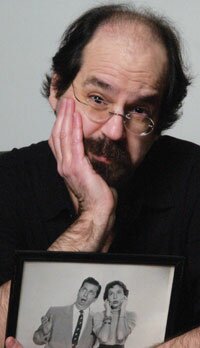HOTSEAT- Very lucky strike: How Fielding found mom... on TV

Lee Fielding
PHOTO BY JENNY LYNN
Lee Fielding remembers the moment, circa 1960, when he first learned about the magic of television. Five years old, he was sick in bed awaiting a visit from his mom, who suddenly appeared– on a television commercial!
"I had no idea what was going on," says Fielding. That's how the future broadcaster learned about the concept of videotape and began his fascination with his mother's brief– but star-studded– career.
"This is a subject I've always loved," says Fielding, a radio talk show host who served as "the lovable liberal," an afternoon antidote to Rush Limbaugh on WINA radio from 1995 to 1997. Now living in northern New Jersey, he's promoting his first book, The Lucky Strike Papers, named for the sponsor of a popular program of the day.
Does the name Morey Amsterdam sound familiar? How about Mike Douglas? Or Snooky Lanson?
They're all dead now, but they all performed alongside Mrs. Fielding, aka "Sue Bennett," whose career tracked those of the brightest lights in American television. For a little while anyway.
Beginning in 1949, Bennett's girl-next-door looks and lucid singing voice launched her from the stages of Broadway to tiny black-and-white screens across America. She sang and danced on Your Hit Parade (a forerunner of the music video) as well as Kay Kyser's College of Knowledge, each among the most popular programs at the dawn of network television.
Yet, at the height of her fame, Bennett gave up her television career by moving away from New York, the center of the fledgling industry. It was a few years later in Boston when Bennett– by then doing commercials, voice-overs, and the "Sue Bennett Show" just for Bostonians, explained to her son the concept of videotape.
Ironically, her son– who began working on the book in 1977– wasn't able to get his hands on any footage of his mother's national work until 2001, the year she died. After years of pleading with the Library of Congress to dub a copy in its holdings, he ended up obtaining a five-minute segment of Your Hit Parade on eBay. (Three years after she died, the Library finally made some episodes available.)
As Fielding writes in the book– published by BearManor Media, a smallish Georgia house specializing in "classic cinema, retro radio, and timeless TV"– the early television shows were performed live. And during the early part of Bennett's career, when a decent television might cost over $900 (over $8,000 in today's dollars), any city west of Chicago had to wait for the arrival of a low-quality film of the broadcast, called a kinescope, since coaxial cable hadn't gotten that far.
It's been seven years since Andrew Lee Fielding (he dropped the first name for his radio work) moved away from Charlottesville to comfort his mother in the last days of her cancer treatment. Her passing was another that marked the end of an era: for one brief shining moment at the advent of the television era, Sue Bennett had graced the screens of TVs across America.
Thanks to her son, she won't be forgotten.
Age: 52.
Favorite Charlottesville hangout? Barnes & Noble
Most overrated virtue? Outrage. Some people are in love with their outrage– people on both the right and the left– and therefore think of themselves as being very virtuous. Often, they're just annoying.
People would be surprised to know: Over the past many years, how increasingly important religion has become in my life.
What would you change about yourself? The list is too long.
Proudest accomplishment?: My book.
People find most annoying about you: The list is too long.
Whom do you admire? A partial list: Elie Wiesel, various writers, Dick Mountjoy
Favorite book? The novels of writer Aharon Appelfeld
Subject that causes you to rant? This usually just makes me ill, rather than causing me to rant: people who, even remotely, try to rationalize the immoral and brutal and psychopathic acts of terrorists. Sometimes they will allude, irrelevantly, to terrorism's "root causes," which is frequently just a way of letting mass murderers off the hook.
Biggest 21st-century thrill? The Internet, and the things computers can do
Biggest 21st-century creep out? The Internet, as a medium of misinformation
What do you drive? 2003 Honda Civic.
In your car CD player right now: Nat King Cole
Next journey? A new book
Most trouble you've ever gotten in? Me? But I'm such a swell guy!
Regret: I interviewed many of the people in my book— singers, comedians, directors, musicians, bandleaders— in the 1970s and 1980s. Many of them— including my mother— are no longer alive. I wish they had been able to read the book.
Favorite comfort food: Vanilla cupcakes
Always in your refrigerator: Vegetarian stuff
Must-see TV: 30 Rock
Describe a perfect day: Reading a superb novel or a religion-oriented book, and writing, with my two cats very close by. Maybe, for part of the day, being at the ocean
Walter Mitty fantasy: Being a Michael Buble-type of band singer
Who'd play you in the movie? Someone who has lost a lot of hair.
Most embarrassing moment? In the mid-1980s, when I was a stand-up comedian, I forgot most of my act one night on stage. Although in retrospect, maybe I did the audience a favor.
Best advice you ever got? Quit smoking.
Favorite bumper sticker? Can't think of one. I'm usually too busy watching out for drivers talking on cell phones who are swerving all over the road.
#
[The print version of this story contained an error about Fielding's home. While he has lived in Philadelphia, he now makes his home in northern New Jersey–editor.]